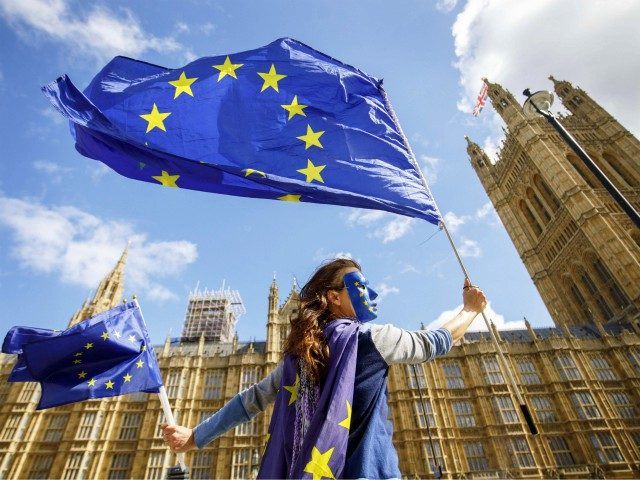The UK has reportedly caved and is set to grant the European Union’s ambassador full diplomatic status, effectively giving the bloc equal stature to a sovereign nation.
The report comes at the same time as the European Parliament finally ratified the UK-EU trade deal, but not before its members branded Brexit a “historic mistake”.
Sources speaking to The Times said that the government is preparing to grant João Vale de Almeida full diplomatic status, with Foreign Office insiders telling the newspaper of record that Downing Street’s decision to not automatically give the EU the same diplomatic rights as emissaries from actual countries had created an “unhealthy, chilling effect” in negotiations between London and Brussels, despite the representative not being hindered in his mission’s role in any fashion.
Weeks after the UK finally left the EU’s institutions, Brussels’ High Representative for Foreign Affairs Josep Barrell had reportedly written to British Foreign Secretary Dominic Raab to air his frustration that the newly-installed Vale de Almeida had not been given the status afforded to representatives of sovereign nations, as per the Vienna Convention.
The status affords missions what is commonly referred to as diplomatic immunity, such as protection from taxation, detention, or arrest. The EU’s representative could reportedly function without the diplomatic rank, but it did mean Vale de Almeida missing some high-status activities, such as the ceremony of presenting his credentials to Queen Elizabeth II.
Eurocrats Brand Brexit a ‘Historic Mistake’ Ahead of Ratifying Trade Deal https://t.co/QnsCzD8mKM
— Breitbart London (@BreitbartLondon) April 27, 2021
Mr Borrell had written in the letter seen by the BBC in January that “the arrangements offered do not reflect the specific character of the EU, nor do they respond to the future relationship between the EU and the UK as an important third country.”
Brussels had felt the European Project deserved a higher status because it can set laws, has a currency, and has courts.
EU sources had also told media at the time that it feared Brexit Britain’s position would set a precedent, and the other more than 140 nations with EU ambassadors might begin to reconsider the status of their missions.
Borrell’s tone hardened later in January, asserting that the UK respect the bloc’s sense of status and demanded that the “United Kingdom treat the European Union delegations accordingly, and without delay”.
Speaking after a meeting of EU foreign ministers, Borrell continued that “we will not accept that the United Kingdom will be the only country in the world that doesn’t recognise the delegation of the European Union the equivalent of a diplomatic mission”.
Days later, in apparent petty revenge, Brussels postponed the first meeting between the UK’s mission in Brussels and senior EU officials.
If given full diplomatic status, it would be seen as a victory for the EU, with Brexit Britain respecting the Union as being of equivalent dignity to a sovereign nation.
France Finance Minister: Europe Must Become an ‘Empire’ to Compete with U.S., Vows to Defy Trump’s Iran Sanctions https://t.co/B5npguZcNG
— Breitbart London (@BreitbartLondon) November 13, 2018
Eurocrats have been open about their intentions to create a superstate, with former president of the European Parliament, Martin Schulz, calling for a “United States of Europe”.
“I want a new constitutional treaty to establish the United States of Europe,” Mr Schulz said in 2017, continuing: “Such a constitutional treaty has to be written by a convention that includes civil society and the people.
“This constitutional treaty will then have to be put to the member-states and those that don’t approve it will automatically have to leave the EU.”
Belgium’s former prime minister and leading lawmaker in the European Parliament, Guy Verhofstadt, had said that the European Union wants to be an “empire”, claiming that the era of nationhood had come to an end.
Addressing the radically Europhile British Liberal Democrat party conference in 2019, said: “The world order of tomorrow is not a world order based on nation-states, on countries — it’s a world order that is based on empires.”
Continuing: “The world of tomorrow is a world of empires, in which we Europeans, and you British, can only defend your interests, your way of life, by doing it together, in a European framework, and in European union.”
In 2017, the then-president of the European Commission, the EU’s executive branch, Jean-Claude Juncker, called for “a fully-fledged European Defence Union” by 2025 — a backdoor to an EU army.
From ‘Dangerous Fantasy’ to Reality in Seven Years: EU Reveals ‘Uniformed Service’ https://t.co/PrvBM6a8So
— Breitbart London (@BreitbartLondon) January 12, 2021

COMMENTS
Please let us know if you're having issues with commenting.